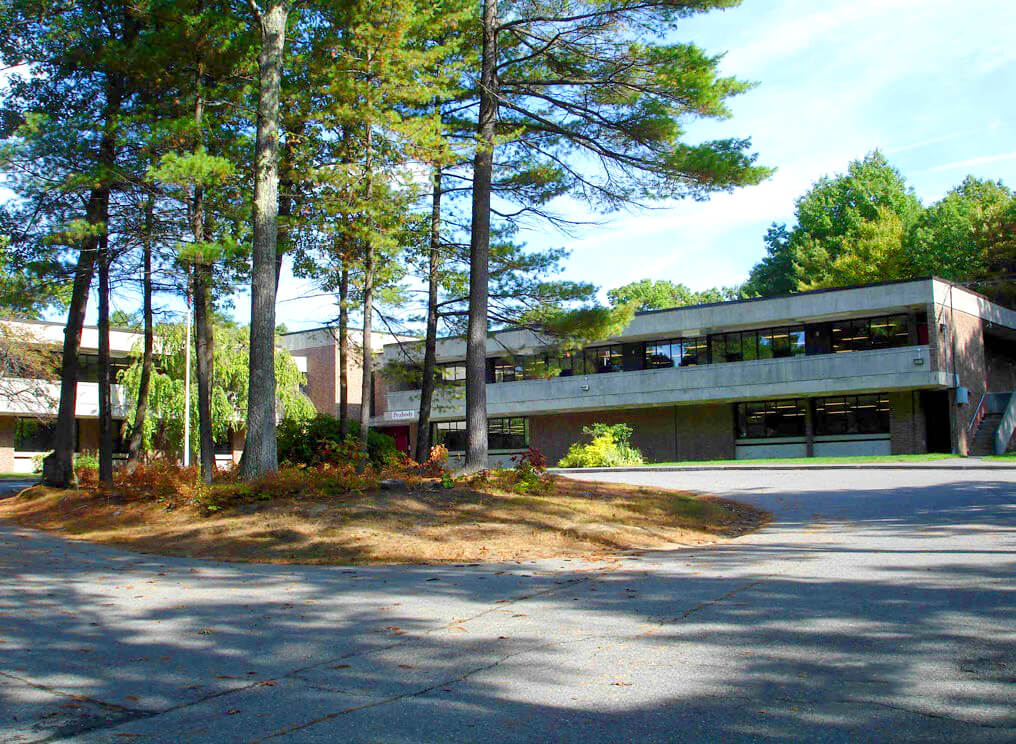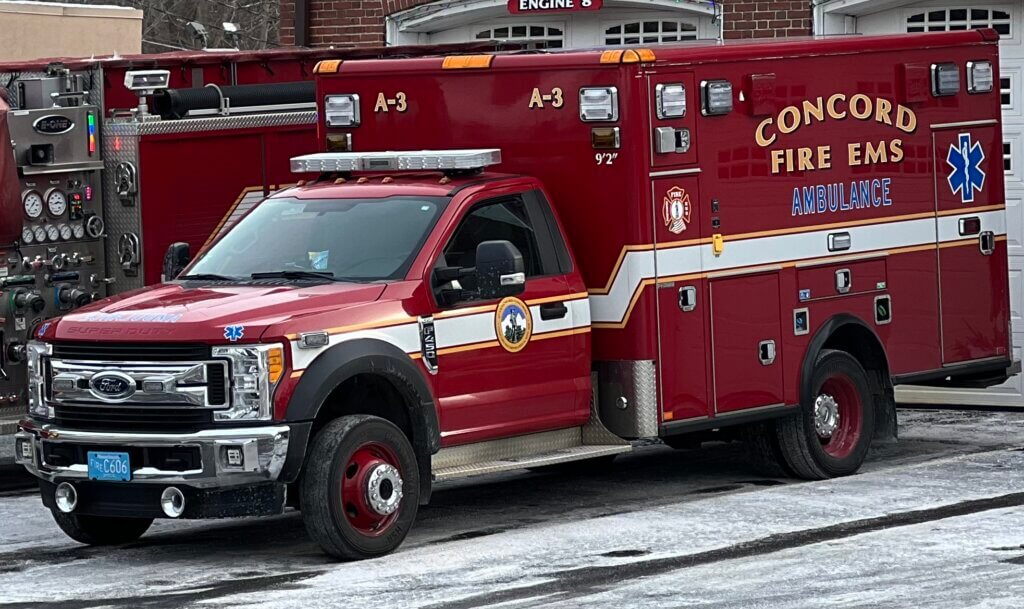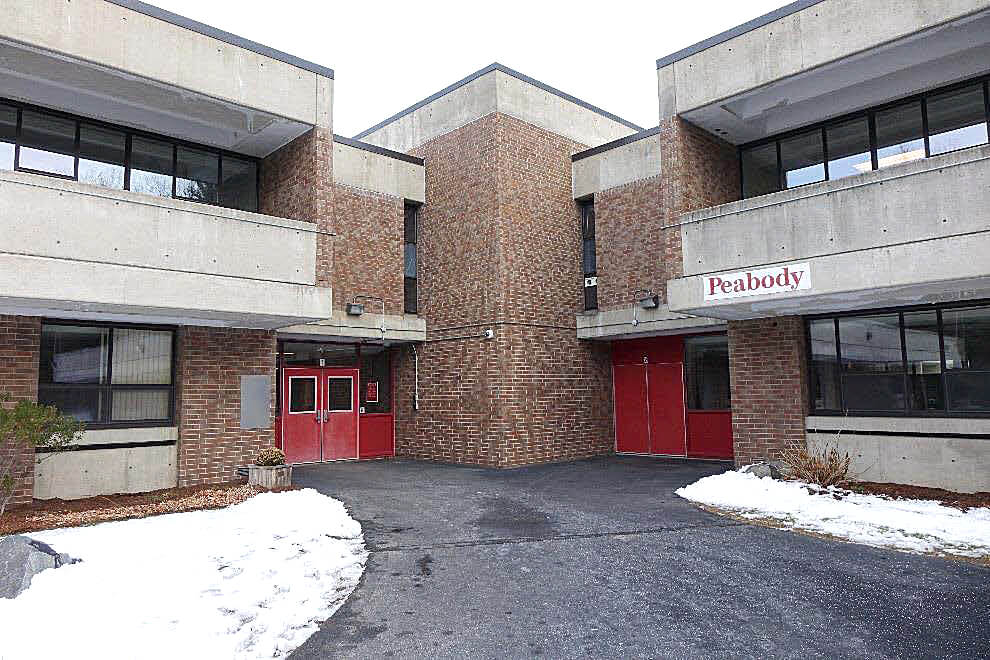By Celeste Katz Marston — Celeste@concordbridge.org
The Select Board has authorized hiring an appraiser for a workup of the Peabody school property, which will come offline when Concord’s new middle school opens in 2025.
“We’re really at the early stages of exploring what the potential use could be,” Deputy Town Manager Megan Zammuto told the board Monday night.
Once the new unified building on Old Marlboro Road opens, Peabody will be turned over to the town — pending a Town Meeting vote of acceptance — and the Sanborn school will be demolished.
Responding to Select Board member Wendy Rovelli’s question about what the town would get out of hiring a consultant, Zammuto said it “could help the town try to understand the highest and best use for the parcels [and] look at what is possible in this area.”
Three-parcel package
According to a presentation the Select Board viewed Monday, Peabody comprises three parcels:
- 1231 Old Marlboro Road, a 7.99-acre property that includes the approximately 55,000-square-foot school building.
- 7B Old Pickard Road, site of just under 10 acres of school fields.
- And 68B Powder Mill Road, two acres of land now used for septic services.
Board member Cameron McKennitt said he likes the idea of a Peabody analysis — but suggested adding guardrails. “We have to give them some direction as to what the spectrum of possible [is],” he said.
Colleague Terri Ackerman agreed. “It’s not necessarily ‘highest and best use’ because we don’t want a [huge] monstrosity built there.”

Select Board chair Mary Hartman noted that the conversation about Peabody’s future dated back to an August joint meeting of the board, the School Committee, and the Finance Committee.
At the time, Chief Financial Officer Anthony Ansaldi “brought up the idea of putting out a letter of interest to developers to say, ‘Hey, what would you do with this land?’” she said. “I think the feedback you got [from] the FinCom was, ‘[We] should do some due diligence beforehand to find out what’s it worth.’”
Hartman, like Ackerman, said the most lucrative use of the Peabody land may not be the one that best serves Concord’s core interests. “For example, the housing community is interested in that for affordable housing,” she said. “That might not be the highest and best use if you think of it as, ‘How do we get the most money out of this piece of land?’ But from the town’s perspective, it might be.”
The board voted 5-0 to go ahead with an appraisal financed by the Land Fund, which currently has a balance of about $41,000, at an expected cost of less than $10,000.
ALS gets green light
Separately, the Select Board recommended spending federal Covid relief funds to support the Fire Department’s move to advanced life support (ALS) ambulance service.

The Fire Department won a nearly $1 million Federal Emergency Management Association grant to shift to ALS, but needed $150,000 more for the full upgrade. ALS enables emergency personnel to administer more invasive treatments and more medications than basic life support.
Fire Chief Thomas Judge and Assistant Chief Brian Whitney said the grant would cover training; the additional funding could underwrite equipment such as a cardiac monitor and an IV pump.
They also said ALS would generate additional revenue, not from raising rates but from bringing the service in-house versus continuing with the town’s third-party contractor.
Dr. Ryan Kring, an Emerson Hospital emergency physician and the town’s EMS medical director, said he’s had ER patients “where the transport time was short, so they came to us quickly — but the patient was very sick, and ALS interventions that started on scene, if available, would’ve had a positive impact.”
Concord Greene resident Wick Sloane praised the department for aiding his family on many occasions and urged the board to support its work.
While saying he could “understand the complexity of the policy and the budget decisions,” he urged officials to consider, “What would happen if these men and women didn’t show up? People would die. People’s injuries would be much worse. And that just has to be factored into the discussions of what to do here.”
“I, for one, would like to support it,” said Select Board clerk Mark Howell.
The rest of the group agreed.






